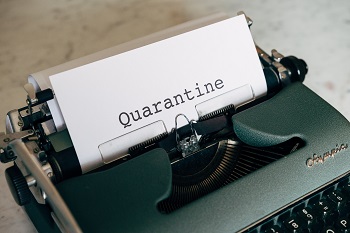Flipping the Script: How Becoming a COVID-19 Patient Challenged My Skills as an Anxiety Therapist
Flipping the Script: How Becoming a COVID-19 Patient Challenged My Skills as an Anxiety Therapist

The night of Sunday April 19, I stayed home with my dog Ritz watching TV and eating takeout from one of my favorite restaurants. Later that night I became very ill, surprising because I’d been eating at that place for a decade without issue. When my alarm went off Monday morning, I felt terrible and my temperature was 100.9°. When Ritz and I take our morning walk we usually go two to three miles, and Sunday had been no exception, but Monday morning I struggled to make it 100 feet. I knew something was wrong.
I went to urgent care and they ran tests determining I was negative for strep and the regular flu. The coronavirus result would take up to a week, but the nurse was concerned about my breathing and recommended I go to the hospital. I don’t know whether I was naïve or it was just wishful thinking, but I assumed that the emergency department would check me out then send me home.
That didn’t happen.
I arrived at the ED around 2pm and was immediately swept into isolation by nurses and techs in full bodysuits. When the attending physician walked in to give me my test results, I expected to hear a presumptive positive for the coronavirus, but it turned out that this wasn’t their first concern: I had pneumonia in my left lung, as well as sepsis. The results from the rapid coronavirus test wouldn’t be back for several hours, but they were admitting me to the COVID-19 unit.
I was shocked and scared. Just yesterday, I’d been fine – how did I get so sick, so quickly? What did this mean for my patients? What about my dog? My family lives 3,000 miles away and would be crushed they couldn’t be here to support me. Did I have to tell them immediately, or should I wait for more answers?
Interestingly, one emotion I didn’t feel at all was anxiety. I’m not certain why. Perhaps I was still in shock from the news. Or maybe I’ve spent so much time teaching and talking about thinking errors that my brain automatically reacted to the news without catastrophizing. I don’t know.
Right now, I’m coping with a lot of unknowns. To say it’s not scary would be a lie. However, it’s also not right to say that I’m never upbeat and positive. My thoughts and emotions – like my vitals and my progress – bounce around. However, there are a few things I know with complete certainty:
- I didn’t get the coronavirus from worrying too much or not worrying enough. I was responsible in following CDC guidelines and my local “stay at home” policies. I didn’t go anywhere other than walking my dog or to grocery stores, and I did so with a mask. I’m grateful to the CDC for their educational and advocacy efforts, as they are without a doubt helpful in flattening the curve, but even behavior based on science and the best information we have isn’t a guarantee.
- I’m not thinking at all about how I got the coronavirus. I fully cooperated with all the questions from my doctors and nurses and the DC Department of Health about how I might have contracted the virus, and hopefully this information will help others stay healthy. But in my alone time (and there’s a lot), I’m not ruminating about how I contracted it. In the end, it doesn’t really matter anymore. I’ve notified the appropriate parties so they can intensify their cleaning and be mindful for symptoms. And yes, I do have guilt about possibly, unknowingly giving this to others. But at this point there’s no mental health benefit to me trying to determine my contamination source. I’ll never know for certain and it has no impact on my medical treatment, so I don’t see value in exerting energy to “figure it out.”
- Death is not on my mind 24/7. There’s no question that the world, including the U.S., has been devastated by this pandemic. As I write this, the CDC is reporting more than 860,000 confirmed cases and 48,000 deaths. I’m not naïve or in denial about these statistics. They’re scary, and yes I am scared. However, overthinking about death – that I might die, how it would feel, what happens after – would prevent me from maintaining a healthy headspace. Thinking about death won’t cause it, nor will it prevent it. However, I know that the more I focus on talking with friends and family, reading, watching television, just trying to rest, the better I feel mentally.
- I’m hearing and listening to all the information the doctors give me. It would be easy to focus on only the worrying details, but the reality is that my test numbers are going to bounce around a bit. When the doctors and nurses express concern about an indicator or test, I ask about the best course of action and I follow those instructions. There are several indicators that have consistently improved, while others spike and drop, and others decline. I chose this hospital because of its wonderful reputation and the excellent treatment I’ve received in the past. If I didn’t trust the hospital and its staff, then I shouldn’t have come here. The doctors and nurses have been responsive, caring, and thoughtful, and they haven’t rushed through anything, including answering my questions or those of my loved ones on the phone. Having all the information not only gives me a realistic perspective on my situation, but also helps me keep my emotions in check.
- I’m still me. Amid x-rays and blood draws and IV antibiotics, I’m still me. When friends and family asked how they could help, I requested pictures of their pets (preferably dogs) and each image brings a smile to my face. When my nurses come into my room and ask how I’m feeling, I often crack jokes or offer a sarcastic reply, to which we both laugh. One is that I’m “still working” on figuring out which symptoms I need to complain about to get a George Clooney-lookalike doctor in here. I’m still giving those close to me grief about anything I can, and Ritz (currently in the care of a friend I trust) is always on my mind. I’m not doing full sessions with my patients yet (my pneumonia doesn’t allow talking for long periods – a relief to some who have met me!) but I’m doing short check-ins, and I have a trusted colleague covering for me if a patient needs more immediate attention. I’m carrying on with my responsibilities as best I can. I’m still planning to attend a work conference in July, and I continue to research a potential trip to Kenya in February 2021.
I don’t know what my future looks like, but I remain hopeful based on my choice to seek medical attention immediately at a reputable hospital, and to follow the recommendations of my doctors. Frequently when I’m in the second or third session with new patients who have anxiety over what they’re struggling with and why they can’t fix it themselves, I tell them I’ve figured out their problem. As their eyes widen, I describe that there’s a clinical term for what’s wrong with them: they’re human. I usually get a smile or a small laugh from that, and then we talk about the realities of being human, including making mistakes, having regrets, and dealing with uncertainty.
Of course, being an anxiety therapist likely reduces my own anxiety about my current condition. However, this isn’t because of some secret technique that cognitive behavioral therapists are hiding. On the contrary, we’re teaching it to our patients every day. Being a CBT therapist doesn’t mean I don’t experience fear, sadness, or helplessness; it means I know how to accept these things and nonetheless continue on. This combined with hope, laughter, and an incredible support system gives me a realistic perspective on my life – my best life – moving forward.
Read Stephanie's June 2020 blog post How a Therapist Becomes a Patient.












